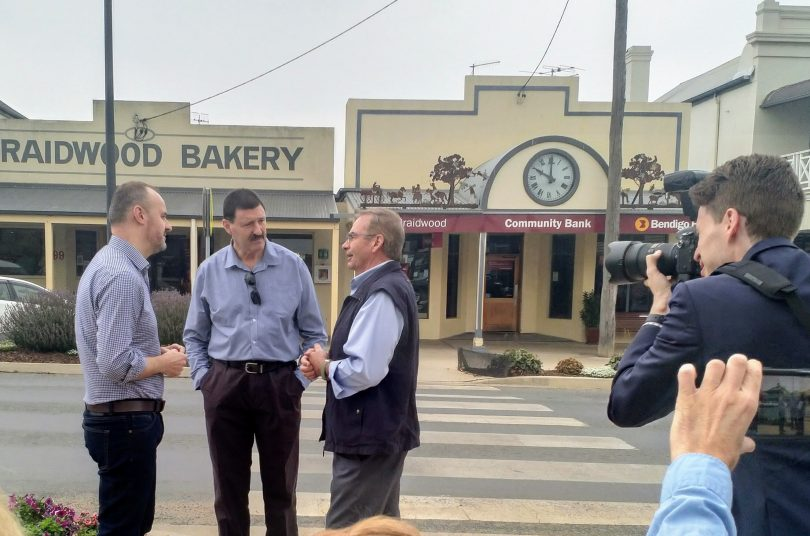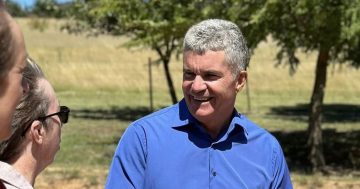
The resignation of Member for Eden-Monaro Dr Mike Kelly (centre) – pictured with ACT Chief Minister Andrew Barr (left) and Queanbeyan-Palerang Mayor Tim Overall (right) – has prompted a by-election, and frenzied speculation. Photo: File.
It can be a mixed blessing for regional areas when suddenly, unexpectedly, the nation’s eyes turn towards you and the media descends.
Quiet communities are inundated with journalists, place names are mangled on the airwaves and startled locals find themselves being interviewed by people clad either in full emergency rig or sporting sparkling new Akubras.
Brace yourself, Eden-Monaro, it’s coming your way again.
Last week, longtime and well respected federal member Dr Mike Kelly announced his resignation as a result of pressing health issues. The prospect of a post-bushfires COVID-19 by-election in the seat next door to the press gallery prompted national front-page news.
Cue frenzied speculation over whether NSW Deputy Premier John Barilaro, surely a shoo-in, would be shaping up to challenge Michael McCormack for the National Party leadership. The federal chess pieces were on the move, with the political strategists close behind.
According to the talking heads, Senator Jim Molan was sure to challenge, as was NSW Transport Minister Andrew Constance, despite clear unwillingness on the part of both Barilaro and Constance to stand against each other.
The inevitable three-cornered contest could pit mate against mate, with the deputy prime ministership potentially in play. The prime minister would have a once in a century by-election win in his sights.
Until John Barilaro went and wrecked it all by deciding not to stand after all. Yesterday, messages emerged allegedly showing an almighty showdown between Mr Barilaro and Mr McCormack over his lack of support, and whether the Nationals leader felt threatened.
Today there’s even more public brawling, name calling and drama.
The problem, of course, is that the Member for Eden-Monaro is not elected on the hill by either journalists or politicians, but by the citizens of Carwoola and Cobargo, Adelong, Wee Jasper and Nimmitabel. All the reporting, all the manoeuvring, all the exciting possibilities come to nothing without the voters.
And very little of the analysis so far has demonstrated much understanding of Eden-Monaro itself, or the concerns of locals, the changing demographics of the seat, or, of course, how anyone votes outside the major metropolitan centres. It’s the same frustratingly lopsided analysis that characterises all regional voters as rednecks and wilfully misunderstands the meaning of parties such as the Shooters, Fishers and Farmers Party as some kind of rural One Nation subset.
Crucially, most of the early reporting completely missed the relevance of Bega Valley Shire Mayor Kristy McBain’s candidacy for the ALP, hardly mentioning her until several days after she was endorsed by Federal Opposition Leader Anthony Albanese, so consumed were they by the conservative narrative.
But not all conservatives. In one Radio National interview, the journalist presented as an expert was so unfamiliar with past and possibly future Liberal candidate Fiona Kotvojs that he either couldn’t remember or couldn’t pronounce her name.
To date, almost nobody has mentioned the woman who sliced a considerable chunk off Mike Kelly’s margin only last year.
Eden-Monaro stretches from Tumut to the far South Coast. In pre-selecting McBain, the ALP has made a clever strategic move: the Bega mayor is a Labor candidate with strong personal appeal in a part of the electorate that traditionally skews conservative. That would have been a neat counter to John Barilaro’s substantial personal vote in the Queanbeyan ALP stronghold.
But the seat itself is far from simple. Queanbeyan is no longer Struggletown as it grows quickly in tandem with Canberra. South Coast communities are full of newly arrived tree-changers and Greens votes have become a significant factor.
Tumut is a long, long way from Andrew Constance’s home base in a state seat that stretches north rather than south, and Constance himself told the electorate after his Malua Bay home was nearly burned out: “No, it is called recovery and then retirement, I think, for me.”
Asked directly at the time if he was ruling out a bid for a job in Federal politics, he replied, “150 million per cent”.
That’s changed several times now too, because things do and in a way that is exactly the point.
Eden-Monaro will be decided in polling booths, big and small, across thousands of square kilometres of regional Australia. It will be decided by people who are worried about bushfire recovery and road funding, and are hit by drought and coping with COVID-19.
They will base their votes on what they care about in their everyday lives. Very few of them will be primarily concerned about the games on the Hill because that won’t decide the election outcome.
Perhaps some media and politicians could take a leaf out of the same book.














